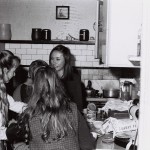Lynette came from Queensland. The girlfriend of my older brother she had followed him back to Melbourne, and he, already interested in another woman, did not know what to do with her.
He spoke to our father, who for reasons I could not fathom then – our house already overflowing with people – told her she could stay a year. She could go to the local high school, Canterbury Girls, and finish her education.
I moved out of the bedroom I shared with my older sister and joined my younger sisters. Lynette took over my bed.
Lynette had long straight hair, a remake of Judith Durham from the Seekers, and she too sang folk songs. She had a husky voice that did not suit the type of singing my older sister had brought into our household from her place as choir leader at the church. But the two of them tried to sing together, my sister, the soprano and Lynette’s voice from deep below.
Both preferred to sing solo and Lynette had to settle for solo in more than just singing once she realised that my brother was arranging to marry the woman he’d returned to Melbourne to meet.
Lynette spent her weekends cross-legged on top of her bed, guitar in hand, with sheets of music spread out before her. She learned the words of songs that spoke of heartbreak and war. Her dark eyes flashing and red gums visible above her white teeth.
The minstrel boy to the war is gone. In the ranks of death you will find him.
Lynette was thin, unlike my sister who had run to fat and the two looked odd together, forced, as they were to share a room.
‘Why doesn’t she leave?’ my sister asked my mother one day after she and Lynette had argued over whose turn it was to use the bathroom.
‘She hasn’t a home anymore,’ my mother said. ‘Her father had a breakdown and her mother is dead.’
The day of my brother’s wedding, Lynette stood at the kitchen sink before we piled into cars. I could see the slope of her shoulders as they heaved over the stove. She was frying an egg in a pan, the edges of which were frizzed like lace.
I wanted to say something to her that might make her feel better. But she had made it clear since her arrival that we were not to speak about my brother, nor about the decision he had made to marry someone else.
All she was interested in were her studies and her music.
The door slammed shut behind us and as we walked past the half open window I heard Lynette’s low voice in song:
The water is wide I cannot cross over, nor do I have the wings to fly
Give me a boat that shall carry two, and boats shall row my love and I.

